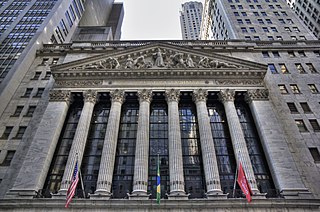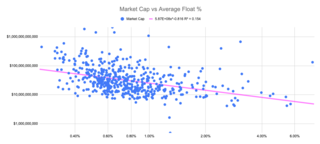Related Research Articles

A stock exchange, securities exchange, or bourse is an exchange where stockbrokers and traders can buy and sell securities, such as shares of stock, bonds and other financial instruments. Stock exchanges may also provide facilities for the issue and redemption of such securities and instruments and capital events including the payment of income and dividends. Securities traded on a stock exchange include stock issued by listed companies, unit trusts, derivatives, pooled investment products and bonds. Stock exchanges often function as "continuous auction" markets with buyers and sellers consummating transactions via open outcry at a central location such as the floor of the exchange or by using an electronic trading platform.
Business is the practice of making one's living or making money by producing or buying and selling products. It is also "any activity or enterprise entered into for profit."

A security is a tradable financial asset. The term commonly refers to any form of financial instrument, but its legal definition varies by jurisdiction. In some countries and languages people commonly use the term "security" to refer to any form of financial instrument, even though the underlying legal and regulatory regime may not have such a broad definition. In some jurisdictions the term specifically excludes financial instruments other than equities and fixed income instruments. In some jurisdictions it includes some instruments that are close to equities and fixed income, e.g., equity warrants.
A closed-end fund, also known as a closed-end mutual fund, is an investment vehicle fund that raises capital by issuing a fixed number of shares at its inception, and then invests that capital in financial assets such as stocks and bonds. After inception it is closed to new capital, although fund managers sometimes employ leverage. Investors can buy and sell the existing shares in secondary markets.
A mutual fund is an investment fund that pools money from many investors to purchase securities. The term is typically used in the United States, Canada, and India, while similar structures across the globe include the SICAV in Europe, and the open-ended investment company (OEIC) in the UK.

A public company is a company whose ownership is organized via shares of stock which are intended to be freely traded on a stock exchange or in over-the-counter markets. A public company can be listed on a stock exchange, which facilitates the trade of shares, or not. In some jurisdictions, public companies over a certain size must be listed on an exchange. In most cases, public companies are private enterprises in the private sector, and "public" emphasizes their reporting and trading on the public markets.

A joint-stock company is a business entity in which shares of the company's stock can be bought and sold by shareholders. Each shareholder owns company stock in proportion, evidenced by their shares. Shareholders are able to transfer their shares to others without any effects to the continued existence of the company.
A real estate investment trust is a company that owns, and in most cases operates, income-producing real estate. REITs own many types of commercial real estate, including office and apartment buildings, warehouses, hospitals, shopping centers, hotels and commercial forests. Some REITs engage in financing real estate.

In a limited company, the liability of members or subscribers of the company is limited to what they have invested or guaranteed to the company. Limited companies may be limited by shares or by guarantee. In a company limited by shares, the liability of members is limited to the unpaid value of shares. In a company limited by guarantee, the liability of owners is limited to such amount as the owners may undertake to contribute to the assets of the company, in the event of being wound up. The former may be further divided in public companies and private companies. Who may become a member of a private limited company is restricted by law and by the company's rules. In contrast, anyone may buy shares in a public limited company.
A joint venture (JV) is a business entity created by two or more parties, generally characterized by shared ownership, shared returns and risks, and shared governance. Companies typically pursue joint ventures for one of four reasons: to access a new market, particularly emerging market; to gain scale efficiencies by combining assets and operations; to share risk for major investments or projects; or to access skills and capabilities.

A private limited company is any type of business entity in "private" ownership used in many jurisdictions, in contrast to a publicly listed company, with some differences from country to country. Examples include the LLC in the United States, private company limited by shares in the United Kingdom, GmbH in Germany and Austria, Besloten vennootschap in The Netherlands, société à responsabilité limitée in France, and sociedad de responsabilidad limitada in the Spanish-speaking world. The benefit of having a private limited company is that there is limited liability.
AIM is a sub-market of the London Stock Exchange that was launched on 19 June 1995 as a replacement to the previous Unlisted Securities Market (USM) that had been in operation since 1980. It allows companies that are smaller, less-developed, or want/need a more flexible approach to governance to float shares with a more flexible regulatory system than is applicable on the main market.
A privately held company is a company whose shares and related rights or obligations are not offered for public subscription or publicly negotiated in their respective listed markets. Instead, the company's stock is offered, owned, traded or exchanged privately, also known as 'over-the-counter'. Related terms are unlisted company, unquoted company and private equity.

Securities regulation in the United States is the field of U.S. law that covers transactions and other dealings with securities. The term is usually understood to include both federal and state-level regulation by governmental regulatory agencies, but sometimes may also encompass listing requirements of exchanges like the New York Stock Exchange and rules of self-regulatory organizations like the Financial Industry Regulatory Authority (FINRA).

The Nairobi Securities Exchange (NSE) was established in 1954 as the Nairobi Stock Exchange, based in Nairobi the capital of Kenya. It was a voluntary association of stockbrokers in the European community registered under the Societies Act in British Kenya. The exchange had 66 listed companies in February 2021.
Share repurchase, also known as share buyback or stock buyback, is the reacquisition by a company of its own shares. It represents an alternate and more flexible way of returning money to shareholders. When used in coordination with increased corporate leverage, buybacks can increase share prices.

In the context of stock markets, the public float or free float represents the portion of shares of a corporation that are in the hands of public investors as opposed to locked-in shares held by promoters, company officers, controlling-interest investors, or governments. This number is sometimes seen as a better way of calculating market capitalization, because it provides a more accurate reflection of what public investors consider the company to be worth. In this context, the float may refer to all the shares outstanding that can be publicly traded.

Stocks consist of all the shares by which ownership of a corporation or company is divided. A single share of the stock means fractional ownership of the corporation in proportion to the total number of shares. This typically entitles the shareholder (stockholder) to that fraction of the company's earnings, proceeds from liquidation of assets, or voting power, often dividing these up in proportion to the amount of money each stockholder has invested. Not all stock is necessarily equal, as certain classes of stock may be issued, for example, without voting rights, with enhanced voting rights, or with a certain priority to receive profits or liquidation proceeds before or after other classes of shareholders.

An investment fund is a way of investing money alongside other investors in order to benefit from the inherent advantages of working as part of a group such as reducing the risks of the investment by a significant percentage. These advantages include an ability to:
Live Company Group PLC formerly known as Parallel Media Group PLC, World Sport Group PLC and Orchard Furniture PLC, is a public company based in Surrey and formerly in London. The company is listed in the Alternative Investment Market. The company was the parent company of both World Sport Group (Jersey) Limited and Parallel Media Group International Limited from 2001 to 2002. However, the founders of World Sport Group Limited bought back WSG in 2002; while World Sport Group plc was renamed to Parallel Media Group plc. Parallel Media Group involved in sports and media agency. However, under the previous name, the listed company was founded as holding company for tea business, and then foundry in 1984, and then furniture businesses in the 1980s.
References
- ↑ The Treasury (June 2007). "Financial Reporting by Unlisted Public Companies" (PDF). Australian Government. Retrieved 6 December 2012.